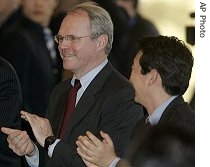2007年VOA标准英语-North Korea to Close Main Nuclear Facility With(在线收听)
Beijing
13 February 2007
A six-day stretch of intense negotiations has produced a breakthrough in efforts to end North Korea's nuclear-weapons programs. VOA's Kurt Achin reports from Beijing, where North Korean delegates have promised immediate steps toward dismantling its nuclear reactor.
 |
| Christopher Hill (l) applauds with others to show approval of agreement during closing ceremony of six-party talks on North Korea's nuclear program in Beijing, 13 Feb 2007 |
"It's certainly not the end of the process," he said. "It is really just the end of the beginning of the process, but I think we are all very encouraged."
Hill is the chief U.S. negotiator in the six-nation talks aimed at convincing North Korea to abandon its nuclear weapons in exchange for economic and diplomatic benefits.
Hill and the delegates from China, Japan, Russia, and South Korea persuaded North Korea to agree to a list of immediate actions toward that goal.
The centerpiece of the deal is Pyongyang's promise to shut down, seal and abandon within 60 days its nuclear reactor at Yongbyon, and to place it under inspection by the International Atomic Energy Agency. In return, the five other nations will provide the impoverished North Korea with 50,000 tons of fuel oil to ease its energy shortage.
Hill says North Korea, also known as the DPRK, will get more fuel - up to nearly a million tons of oil - if it moves on to another phase of the agreement.
"A phase that will involve the disabling of all of the nuclear facilities of the DPRK. Plus, that phase involves the submission of the complete declaration of nuclear programs," he said.
The agreement also calls for the United States and Japan to open talks with North Korea on establishing diplomatic relations.
The latest dispute over North Korea's nuclear ambitions began in 2002, when Washington says it confronted North Korea with evidence of its secret uranium-enrichment program.
North Korea has never admitted having the program, and Hill says the issue still needs to be addressed.
"We do not have an agreement at this point even on the existence of this [uranium enrichment] program," he said. "But I certainly have made very clear, repeatedly, that we need to ensure that we know precisely the status of that."
An obstacle that held up the nuclear talks for more than a year - U.S. sanctions targeting alleged North Korean illegal activities at Macau's Banco Delta Asia, did not have a major role at this week's talks. Hill says the issue will soon be resolved.
"The United States has committed that we will resolve the matter of the financial sanctions pertaining to BDA [Banco Delta Asia] within 30 days," he said.
Experts on North Korea already are noting that this agreement may not prove lasting. Pyongyang has signed international agreements in the past - with the United States, South Korea and the International Atomic Energy Agency - to not develop nuclear weapons. Yet it has several times attempted to do so and last October, tested its first nuclear explosive device.
The agreement is now to be handed over to five different working groups, which will handle technical aspects of implementing it.
Hill says he will soon meet with his North Korean counterpart, Kim Kye Kwan, for talks in New York. Another six-party meeting is tentatively scheduled for March 19, and the participating nations hope to schedule a minister-level meeting in about two months.